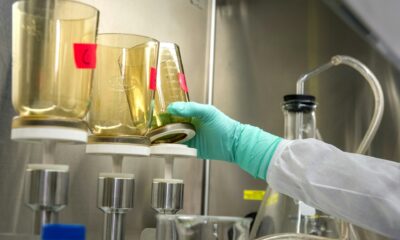Biotech
Liège-based start-up Syngulon launches new anti-microbial bacteriocins
The small synthetic biology company “Syngulon” develops technologies based on bacteriocins, natural molecule properties which are of interest to several industrial sectors. It has just signed a memorandum of understanding with a Chinese group. Syngulon has attracted the attention of the Walloon Region, which funds various research programs, and joint project started in 2017.

Bacteriocins can be used to combat food pathogens, improve bioethanol production, or in some cases even replace antibiotics. Molecules that are naturally synthesized by certain bacteria and have antimicrobial properties.
Bacteriocins were discovered in Belgium in 1925 by Professor André Gratia. But like phages – bacteria-killing viruses – their potential interest was quickly overshadowed by the appearance of the first, much more effective, antibiotics. They fell into oblivion, with the exception of nisin, which had been used for more than 70 years as a food preservative.
A small synthetic biology start-up from Liège, Syngulon, wants to bring them up to date, and Born2Invest brings you the latest biotech breakthroughs from around the world, such as this one. Our companion app allows you to get the business headlines in sectors such as biotech, finance, cannabis, and many more. Our app distills news into 500 characters or less so that you are always informed no matter where you are, or how tight your schedule is.
“Bacteriocins generally have a rather narrow spectrum of action,” explained the company’s CEO and co-founder, Guy Hélin. “So they only kill contaminants, not good bacteria. They can also act as a genetic firewall that will kill microorganisms as soon as they leave the control area.”
The young biotech company, which was accompanied by the WSL incubator, has built the largest collection of bacteriocins in the world thanks to the work of specialist Philippe Gabant, co-founder of the company, and pioneer in the development of selection technologies in molecular biology. “We started in stealth mode, without any press release or website,” continued Guy Hélin.
The aim was to take out patents on the use and production of bacteriocins. “We started in the U.S., which is an authority in this sector.”. The company now owns 5 families of patents, some of them in collaboration with universities. Guy Hélin continued by saying “We are indeed a start-up in the labs. All our scientists are based in academic laboratories which are our partners, the aim being to develop with the knowledge of the mechanisms and action spectra of bacteriocins and to file patents,” continued Guy Hélin. The team works with UCLouvain, ULB, and ULiège, but also works in the UK with the University College of London and Imperial College.
An initial partner
Syngulon has attracted the attention of the Walloon Region, which funds various research programs. It then found its first industrial partner, the French company Tereos, the world’s third-largest sugar group and the largest ethanol producer in Europe. A joint project started in 2017, and Tereos seems convinced that the Belgian company has the solution to the contaminants that can proliferate in their fermenters for the production of ethanol.
The next step should be the undertaking of licenses by the French cooperative company, hopes Guy Hélin, who states that “Syngulon’s aim is not to produce. Our business model is to develop technologies and to license, a priori non-exclusive, our technology.”.
In 2016, Syngulon started to present its know-how to the pharmaceutical and cosmetics sectors. Syngulon’s technology can also be used to combat genetic drift, the evolutionary mechanisms that lead to the appearance of new characteristics in living organisms. This could provide weapons to secure the production of vaccines or biological drugs.
Today, the corporation is also in discussions with companies that are embarking on second-generation bioethanols. Syngulon has also won over players in the animal nutrition and health sector. During the recent economic mission to China, the biotech company signed a memorandum of understanding with the Eppen Group for the development of a new generation of food probiotics using bacteriocins as a natural alternative to antibiotics.
Associated with risks of resistance, antibiotics used as growth promoters (GF) for animals will be banned in the feed industry in China in 2020. In total, Syngulon, whose shareholding remains entirely private – without investment or venture capital – estimates that it has 5 or 6 prospects for signing licenses.
__
(Featured image by Bill Oxford via Unsplash)
DISCLAIMER: This article was written by a third party contributor and does not reflect the opinion of Born2Invest, its management, staff or its associates. Please review our disclaimer for more information.
This article may include forward-looking statements. These forward-looking statements generally are identified by the words “believe,” “project,” “estimate,” “become,” “plan,” “will,” and similar expressions. These forward-looking statements involve known and unknown risks as well as uncertainties, including those discussed in the following cautionary statements and elsewhere in this article and on this site. Although the Company may believe that its expectations are based on reasonable assumptions, the actual results that the Company may achieve may differ materially from any forward-looking statements, which reflect the opinions of the management of the Company only as of the date hereof. Additionally, please make sure to read these important disclosures.
First published in L’Echo, a third-party contributor translated and adapted the article from the original. In case of discrepancy, the original will prevail.
Although we made reasonable efforts to provide accurate translations, some parts may be incorrect. Born2Invest assumes no responsibility for errors, omissions or ambiguities in the translations provided on this website. Any person or entity relying on translated content does so at their own risk. Born2Invest is not responsible for losses caused by such reliance on the accuracy or reliability of translated information. If you wish to report an error or inaccuracy in the translation, we encourage you to contact us.

-

 Crowdfunding2 weeks ago
Crowdfunding2 weeks agoReal Estate Crowdfunding in Mexico: High Returns, Heavy Regulation, and Tax Inequality
-

 Markets2 days ago
Markets2 days agoMiddle East Escalation Sparks Market Uncertainty as Oil and Gold Poised to Rise
-

 Cannabis2 weeks ago
Cannabis2 weeks agoSouth Africa Proposes Liberal Cannabis Regulations with Expungement for Past Convictions
-

 Crypto7 days ago
Crypto7 days agoCrypto Markets Under Pressure as Vitalik Buterin Sells 17,000 ETH

























